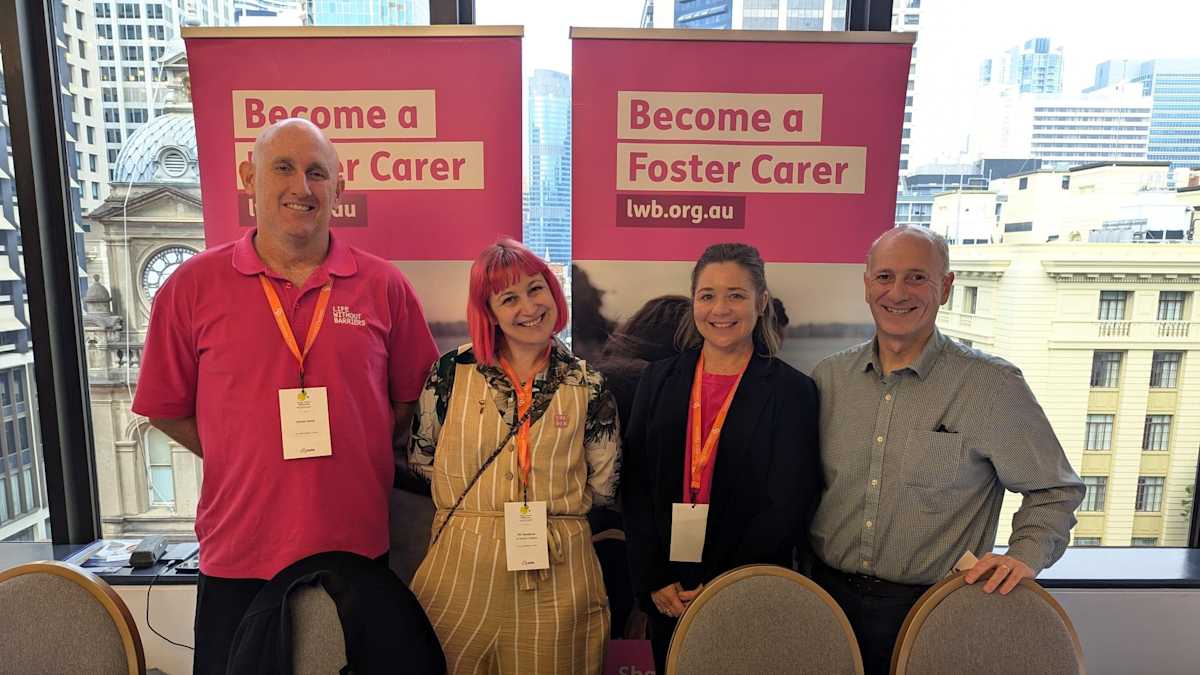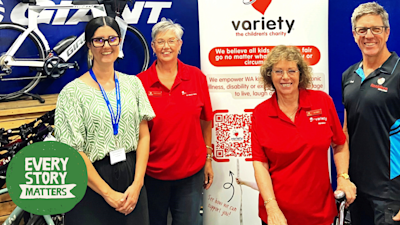A day in the life: strategic vision meets lived experience.
In the world of child, youth, and family services, change isn't just a word—it's a mission, a vision, and a daily commitment to making lives better. At the heart of this mission is the staff working every day for the people we support.
Recently, we sat down with Anthony Raitman, Executive Director of Strategic Initiatives at Life Without Barriers at the National Kinship, Permanent and Foster Care Conference (NCC) and discussed why he chose to join the not-for-profit sector and what his team does to improve outcomes for children and young people in care.
"My day-to-day looks very different every day. I have a lot of consultations, discussions with children and young people, discussions with carers and conversations with staff to try and get the best outcomes that we can," Anthony shared.
As someone who is deeply involved in strategic initiatives, his work ranges from developing long-term plans that can take months to come to fruition, to the more immediate task of crafting business and project plans. Yet, at the core of his responsibilities is the future—planning it, shaping it, and ensuring that the strategies he develops have a lasting impact.
Although Anthony's role is largely strategic, he sees the value in direct interaction with the children and young people we support.

Image: Two young people stand together with their arms crossed. Their faces are hidden by leaves on a tree.
"We have re-established a National Youth Advisory Group," he explains.
“That gives me the chance to meet with young people and really understand their experience of the system, what they would like to see change, and how we achieve these changes.”
"It grounds my thinking and gives me a really good sense of what we can do to help improve the lives of children and young people," he reflects.
This direct line to the voices of the youth not only informs his work, but also ensures that the strategies he develops are responsive to the needs and wishes of those they are designed to help.
One of the most significant initiatives Anthony has been involved in is the Transformation Project. Life Without Barriers has committed to transitioning Aboriginal and Torres Strait Islander children from its care back to family, Community, kin, and Aboriginal Community Controlled organisations. At the NCC, Anthony co-presented with Shannon Mackie, State Director Aboriginal and Torres Strait Islander Practice and Partnerships, on our Elevate Reconciliation Action Plan.

Image: Life Without Barriers staff selfie at the NAIDOC March, 2024
"Our presentation at the NCC focussed on our journey to date, about the importance of making that decision, but also about the challenges in supporting children and young people and their carers to understand those changes," Anthony shares.
This project isn't just about policy—it's about people and relationships. It's about supporting children and working closely with Aboriginal Community Controlled Organisations to ensure they have the capacity to support their children and young people effectively. It's a journey of returning to culture, and to the community who know and love these children best.
Anthony chose to move to Life Without Barriers after three decades in government and we wanted to know why. The answer lies in both a desire for change and a deep alignment with the values of Life Without Barriers.
"I thought it was time for me to take up a new challenge in the not-for-profit sector and extend my skills and experiences," he explains.
The organisation's national scope and its commitment to having a large-scale social impact resonated with Anthony.
"I was really attracted to Life Without Barriers because the values of the organisation really spoke to me," he adds, highlighting the organisation's focus on social impact and systems advocacy as key factors in his decision.
“As a strong and large systems advocate, we can really achieve big changes.”
Leading a national team, Anthony is involved in the commissioning of work and writing tender specifications to support children and young people. But more than that, his leadership is about ensuring that the voices of young people are not just heard but are central to everything the organisation does.

Image: A teenage girl stands between two people, she is wearing a white t-shirt and smiling at the camera.
“We are focused on having the voice of young people deeply embedded in our work,” Anthony shared.
"I think the level of accountability that young people bring to our work is incredibly powerful."
For Anthony, it's not just about making decisions in boardrooms—it's about being held accountable by the very people those decisions affect.
“I'm at a stage in my life where I am less connected with what children and young people need in their life and what's important to them. While I might think, visits to the zoo or the museum might be important, they might say to me, ‘having access to the basketball court around the corner is more important to me’. I may not have thought about that,” Anthony said.
“It is really important to hear the perspective of children and young people in the sense of the work that we do.”
“In a previous role we were celebrating the receipt of a large philanthropic grant to develop a new program for young people leaving care, called Brighter Futures.
When I discussed the successful grant with Dylan who had been actively involved in designing the program he looked at me fair square in the eye and said, ‘you haven't done anything yet, come back to me when you've done something and then we'll really celebrate’."
"And I just thought, he's right. It was at that point that I committed myself to ensure that people with lived experience informed all of my work from then on.”
“Looking back, I can see that the achievement in his mind was very different to what I thought the achievement was. And that goes back to that accountability to say, don’t tell me what you're going to do, just go out and actually do it.”
This is true not just for children and young people; it also holds true for the care-providers.
“Being at this conference has really impressed upon me the importance of bringing our carers together.”

Image: Steven Mead, Phi Theodoros, Nicole Pulsford, and Anthony Raitman at the Life Without Barriers stall at the AAFIE Doing School Differently Conference.
“What we've learnt and what we're hearing in the work that we're doing is the peer support for carers is really critical to build resilience, to build support networks, to retain carers in their role for longer periods of time.”
“For me to be able to sit with carers from different states and being able to hear their stories and hear their genuine achievements and their challenges and frustrations really both inspires me and drives me to do the work that I do. It also focusses my attention on what's really important.”
For Anthony, and Life Without Barriers, the journey is ongoing. There is much to learn, much to achieve, and always more to be done to improve the lives of children and young people across Australia in partnership with them, our carers and staff.


